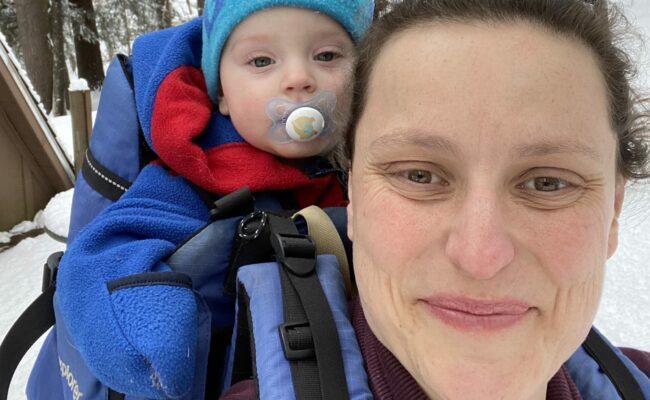
Recently, my 9-month-old was referred for an Early Intervention evaluation. My rational brain is grateful for the opportunity to include an early interventionist on his support team alongside his teachers, my partner, and me, and as someone working in the early childhood system, I know that this is what he needs to be successful. My “mom” brain, not surprisingly, is struggling to get there, but talking to his teacher and my child development colleagues is helping me to get grounded and focus on what is best for my child.
How did we get here?
Since I started with Building Bright Futures four years ago, our team, alongside Help Me Grow Vermont, has been promoting awareness of the CDC’s “Learn the Signs, Act Early” campaign, including access to developmental screenings, and connection to Early Intervention when a concern is identified. Needless to say, I downloaded the Milestones Tracker app during my pregnancy.
For the first few months of using the app, it was super fun to check off the milestones. Yes! He can hold his head up. Yes! He has started to babble. Yes! He likes to look at himself in the mirror. When we completed his 4-month Age and Stages Questionnaire (ASQ) at his child care center, we checked off almost everything in each of the categories of the developmental screening tool.
When we got to the 6-month milestone checklist, there were a few things that he wasn’t doing. Is he rocking back and forth on his hands and knees? Not yet, but I wasn’t too concerned. All children are different, he is the oldest in his class, he doesn’t have a sibling to copy, etc., so I let it go.
In the 9-month checklist, there were more milestones he wasn’t meeting. I spent a lot of time going back and forth. Was I overreacting? Am I someone who has just enough information to cause more worry?
I finally decided to reach out to his child care center. They were already planning to use the ASQ developmental screening prior to the spring parent conferences, but they were more than willing to jump ahead and complete a screening in his classroom as well as sending one home for us to complete. As we were completing the screening at home, it became clear to me that he was indeed behind in both communication and gross motor development. So when we talked with his teacher after the classroom screening was completed, we were not at all surprised that a referral was the next step to be able to support our child.
What’s next?
I am lucky to know many of the early interventionists from Children’s Integrated Services at The Winston Prouty Center, so I’m not going into this blind. Even so, I’m still not sure what this process and intervention will include—especially during a pandemic.
How impressive is it that, in our Vermont communities, every child and family has a variety of opportunities and settings in which to complete these screenings? These screenings have become the norm rather than the exception—reducing stigma, increasing the opportunities for early identification and intervention, and supporting each and every child.
I’ve been sharing this message for four years as part of my work, but a theoretical understanding is different from a personal experience. You can be sure that our family’s journey will inform my approach to this work.
All in all, both my rational brain and my “mom” brain are glad that he will be able to get the services, resources, and supports that he needs.


